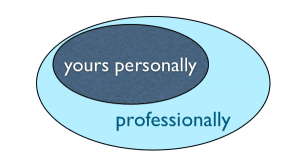Is Personification Possible?
I believe that the chances are very low that this question is foremost on CEO’s minds. Yet, I would argue that this is one of the central strategic questions of any serious brand on three levels. Why?
The brand must get personal
The brand must get personal because the most profitable client is a loyal one. {If you agree, tweet this}. The link? While very rare products are exceptionally different — until they are copied and/or surpassed — the surround-sound qualities of the BRAND will perpetuate the relationship in the mind of the consumer. {Tweet this?} The key is that people are looking beyond the functional properties in their choice. The interaction with the most oomph is a personal one: at the store, on the phone with customer service, chatting on the Facebook page/Twitter account or even with the delivery person. In each case, the experience depends on the individual representative. Those moments allow consumers to “feel” the brand.
Technology is warm. Brands are cold?

As we saw recently in a survey by Havas Media in France, if you are not contributing to the customer’s daily existence and to his/her happiness, then a brand can quickly fall out of favor. In the case of Apple, the (still) delightful user experience on the device and the friendly, impassioned service in the Apple Stores has upped the ante considerably. Amazon (not in France’s top 20… yet) is obsessed with the customer and it shows in their superior total customer service. Google has managed to keep its home page clean and clear because it has remained loyal to its mission to connect people to what they want.
Consumer brands must realize that technology is not cold. Marketing cannot be a robotic ROI-obsessed activity — especially as it applies to digital technology. Brands must learn to up their digital IQ, enhance the customer experience via the digital devices and allow for a more intimate and personalized cradle-to-grave experience. A brand with empathy necessarily requires its employees to be the brand. {Tweet this out}.
The battle for great talent
The battle for great talent is hardly incidental to success. If the brand can provide a fulfilling experience for its employees, in alignment with their personal value systems, then there is a greater chance to retain talent. That takes “feeling” the brand by the employees. Brands must invest time and effort in bringing their employees into the fold, not just teaching them how to do a better job. On a first level, this involves sharing a set of values, a common language and behavior. If the brand has a higher mission to which employees can personally relate, the chances are that employees will be more prepared to go the extra mile.
The power surge thought
Here is the power surge thought: The consumer looking for a deeper connection with the brand will meet with the empowered and engaged employee and that relationship will win time and again when the employee is the brand. {Tweet this out!} The good news is that consumers have never had a greater need for meaning and sense. Brands are perfectly placed to provide that meaning. The trick is having the employees believe and transmit.
Your thoughts and reactions?












A good brand sold by lousy people becomes a bad brand. It is the service that counts, especially on e-commerce where offers are galore…but reliability in accuracy, sound payment process and delivery terms is quintessential. So you are right in stating that the employee is the brand, including in e-commerce the software developers on whom the success of a good consumer/brand /retail outlet relationship depends hugely on the sound and logical setup of the sales software for the web-platform.
A good brand sold by lousy people becomes a bad brand. It is the service that counts, especially on e-commerce where offers are galore…but reliability in accuracy, sound payment process and delivery terms is quintessential. So you are right in stating that the employee is the brand, including in e-commerce the software developers on whom the success of a good consumer/brand /retail outlet relationship depends hugely on the sound and logical setup of the sales software for the web-platform.
A rule of thumb about branding is that it should always reflect its vision. If it doesn't, the brand strategy could lead to nowhere or could have a bland taste to its niche market.
My recent post Fast Company: The Truth About Being “Done” Versus Being “Perfect”
A rule of thumb about branding is that it should always reflect its vision. If it doesn't, the brand strategy could lead to nowhere or could have a bland taste to its niche market.
My recent post Fast Company: The Truth About Being “Done” Versus Being “Perfect”